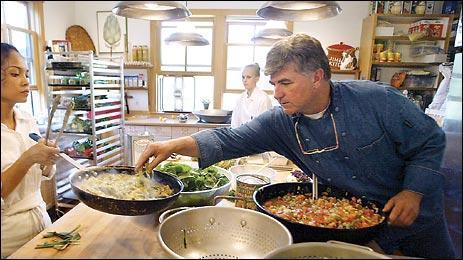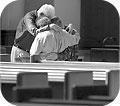 |
 |
|
|||||||||||||||||||||

|
||
|
AFTER SEPT. 11, Americans donated money, time and sweat, often at personal sacrifice, toward those directly affected by terrorism. In the Puget Sound area, Tom French was one of those who stepped up, launching a cross-country bus tour to inspire people to think constructively about ways to avert a repeat of the terrorism. The story of Tom French
Chefís campaign for understanding confronts everyday terror of the streets |

STEVE RINGMAN / THE SEATTLE TIMES
|
|
|
By Stuart Eskenazi Seattle Times staff reporter Tom French emerged from a restaurant on Chicago's North Side and considered the symbolism of the moment. Here he was in America's heartland, in the midst of his Heart of America Bus Tour, having just finished dinner at the Heartland Cafe. "This is where the rubber hits the road," he thought to himself. French, 48, a Whidbey Island chef, has spent much of his adult life placing his faith behind the powers of food and people. If anything could extract clarity from the Sept. 11 haze, it would be commingling the two. In the aftermath of the terrorist attacks, French sensed Americans' willingness to open their hearts and stretch their minds. So he hatched a strategy to inspire community dialogues. He would rent a rock 'n' roll tour bus, visit a half-dozen cities and treat residents to a feast. Individuals would sit around the dinner table and discuss how to prevent a repeat of Sept. 11. Chicago was the second stop of the bus tour, which rolled out of Seattle on Thanksgiving Day. Hosted by a church in the ethnically diverse Rogers Park neighborhood, French and several locals had dined at the Heartland to go over the weekend plans. Feeling shut in from a week on a bus, French preferred to inhale the unseasonably warm evening and walk back to the church alone. "Don't worry," a local assured him. "You'll never get mugged here." But halfway into his three-block walk, a teenager emerged from a schoolyard, asking for the time and then for a dollar. Out of the corner of his eye, French could see another half-dozen young men racing toward him. One grabbed him from behind in a choke hold and French buckled to the ground. Laughing all the while, the young men punched and kicked him as he lay on his side. French could see little beyond a vision of his 6-year-old son's face, which gave him the strength to rise and run. The teens stole his backpack, which contained only some recorded interviews about Sept. 11 he had gathered earlier. Violence no longer abstract to him, French quickly grasped the parallels between the Chicago assault and the Sept. 11 attacks. "What happened to me was a form of domestic terrorism that goes on every single day in the United States," French reflects. "In every large city, there are these people. So then you ask yourself, who are they and how did they get so angry?" He had encouraged people to ask themselves the same questions about the Sept. 11 terrorists. Now French could react to his assault with the vein-popping vengeance he had been discouraging. Or he could remain loyal to his values. His soul was on trial. "Chicago was a personal moment of truth," French says. Emotional wounds Despite a broken arm and elbow, French denied the pain of the assault to everyone around him. Secretly, though, he was dispirited. He vacillated on the merits of the bus tour and considered returning home to the comforts of his wife and two boys. The Rogers Park feast proceeded as scheduled. The bus rolled out of Chicago, headed to Boston. But after a couple days, French could not ignore the feeling that he had left the city in a bad place. In Chicago, he had asked individuals to ponder four questions related to Sept 11: • Between giving up and stepping up, where are you? • What are you most afraid of? • Is there hope? • What steps can you take to build solutions from within your community? He asked himself the same questions about the assault. He told the driver to turn the bus around. "I had decided what happened in Chicago happened for a reason and that we should go back and work with it," he says. A road to understanding French wanted the perpetrators behind Sept. 11 held fully accountable, yet he also saw virtues in examining the roots of their rage. "What I wanted to believe was that if we could take a nonretribution approach to violence, it could be the beginning of something really good," he recalls. French grew up in segregated rural Arkansas and Missouri, in a region called Little Dixie. "I have spent the latter part of my life unraveling those prejudices and trying to be an honest, open, caring person," he says. Fatigued from working in the cutthroat world of restaurants, French moved to the Pacific Northwest from New Orleans in 1996. He landed a job that combined the powers of food and people — executive chef at FareStart, an innovative Belltown cafeteria that trains homeless and disadvantaged persons for jobs in the food services industry. French helped catapult the program into national prominence. He left FareStart in 1999. With wife Katie he started Tableau, a catering and event business, and Bountiful Table, a nonprofit that brings people together around a table to examine social issues. He took on the Heart of America Bus Tour with the same optimism that nourishes both ventures. The Chicago assault could have disillusioned him. Instead, it aroused him. Attacking the problem Police said the young men arrested carried out the assault as a street-gang initiation. "I know who they thought I was, coming down that street," says French, who has bushy gray hair, ruddy cheeks and a robust build. "I know the stereotype of the white guy who probably has money. I also can see what would lead to stereotypes where people could really hate the system so much. "The system doesn't work for them, so what are they left with? Lashing out, anger, violence as a way to feel like they are doing something. They laughed the whole time. It was like a joy ride." When French returned to Rogers Park, he and local leaders brainstormed ways to address the neighborhood's crime problems. Discussion always came back around to providing an alternative to street gangs. French kept thinking about Fernando, a 15-year-old taking part in a student art project at the Rogers Park church. The teen stayed at the church all day, which French thought odd until learning that Fernando feared going outside, where other teens were pressuring him to join a gang. A course of action emerged. French secured the assistance of a local chef and is helping start a culinary training program, similar to FareStart, for disadvantaged youth in Rogers Park. The project is just getting off the ground, with French acting as consultant, preferring that the community shape it. The goal is to give teens like Fernando a place to go, a reason to be productive. Destiny ŗ la carte Today, French regards his Chicago experience as an epiphany, the reward after months of violent nightmares, anxiety attacks and mood swings. At his Whidbey Island home, which looks out across the Cultus Bay tidelands, he stores mementos of the bus tour in plastic storage tubs. He digs through them to find Fernando's work: a drawing of a big-city skyline, dark clouds shooting lightning, a devil's head suspended in the sky, a pierced heart colored mostly black. On the back, a poem:
The change I am becoming is like a world falling apart.
To French, however, destiny is like a recipe. Something to tinker. "I've always believed," he says, "that if we were all just a little bit more compassionate, understanding and willing, that's all it would take." Stuart Eskenazi: 206-464-2293 or seskenazi@seattletimes.com. |
|
||||||||||||
seattletimes.com home |
| Home delivery | Contact us | Search archive | Site index |

